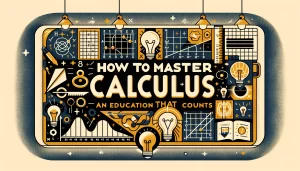Introduction: The Crucial Role of Feedback in Calculus Education
In the educational journey of a high school student, timely and constructive feedback, especially in a subject as challenging as calculus, is crucial. Parents like Sarah and James often witness their son, Luke, spending hours solving complex calculus problems, yet without timely feedback, he struggles to gauge his understanding and progress. This lack of feedback can lead to a cycle of uncertainty and frustration, hindering his ability to grasp calculus concepts fully. It’s a common scenario in many households, where students put in the effort but lack the guidance to correct mistakes and deepen their understanding.
Understanding the Impact of Feedback
Feedback in calculus is more than just a right or wrong answer; it’s a tool for learning and improvement. When students like Luke receive feedback that is specific and constructive, it illuminates areas of misunderstanding and provides direction for further study. Without this guidance, students may continue to make the same mistakes, limiting their progress and growth in understanding the subject.
The Challenge of Obtaining Feedback in Large Classes
One of the challenges in a typical high school calculus class is the teacher-to-student ratio. In large classes, it becomes difficult for teachers to provide individualized feedback to each student. Luke, like many others, may not receive the attention he needs to clarify his doubts and correct his misconceptions, leaving him to navigate the complexities of calculus largely on his own.
Parental Involvement in Seeking Feedback
Parents play a pivotal role in filling this feedback gap. They can start by discussing with Luke’s teacher about his progress and understanding of calculus. Regular communication with the teacher can provide insights into Luke’s performance and areas where he needs more help. Parents can also review his assignments and tests to identify patterns in errors or topics that consistently pose difficulties.
Encouraging Self-Assessment and Reflection
Encouraging students to engage in self-assessment is another effective way to enhance learning. Luke can be guided to review his work critically, identify areas of uncertainty, and develop questions to seek clarification. This practice not only helps in consolidating his understanding but also fosters a habit of reflection and independent learning.
Utilizing Digital Tools for Immediate Feedback
Digital tools and online platforms can be invaluable in providing immediate feedback. Interactive calculus software and educational apps offer instant responses to problems, helping students like Luke understand where they might be going wrong. These tools often come with detailed explanations for each step, allowing for a deeper understanding of the problem-solving process.
The Importance of Constructive and Positive Feedback
The nature of the feedback is as important as its timeliness. Constructive and positive feedback can motivate students, boosting their confidence and interest in the subject. Parents can help by focusing on what Luke is doing right and how he can build on his strengths rather than just pointing out his mistakes.
Seeking External Help for Specialized Feedback
Sometimes, external help, such as a private tutor or a calculus help program, can provide the specialized feedback that students need. Tutors can offer one-on-one attention, addressing specific areas of weakness and providing tailored feedback that might not be possible in a classroom setting.
The Role of the Math Thought Program
The Math Thought Program is designed to offer comprehensive support in calculus, including timely and constructive feedback. The program’s tutors focus on understanding each student’s individual needs, providing personalized feedback that is both encouraging and instructive. This approach can be particularly effective in addressing the specific challenges that Luke faces in his calculus learning journey.
Conclusion: Feedback as a Cornerstone of Successful Learning
For parents helping their child navigate the rigors of calculus, understanding the importance of timely and constructive feedback is essential. By actively seeking feedback, encouraging self-assessment, and exploring resources like the Math Thought Program, parents can play a crucial role in enhancing their child’s calculus learning experience. Feedback, when used effectively, can transform the learning process, turning challenges into opportunities for growth and mastery in calculus.





